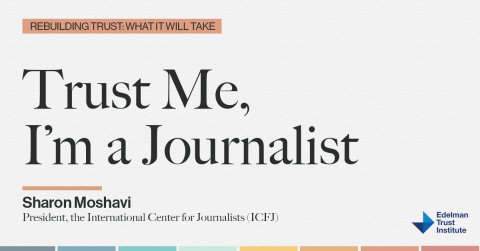Dear Friend,
The new year is the perfect time to reflect on the state of journalism today and what to expect (and strive for) in 2022. One of the most urgent challenges is declining trust in the news media. Fueled by political polarization and a swamp of disinformation, public confidence in journalism has reached crisis levels – and the consequences are serious not only for the industry, but for the health of our democracies. What can we do to reverse this dangerous trend?

In my essay for Edelman Trust Institute out this week, I call for a fundamental rethink of journalism, from how news is produced and distributed to how it interacts with audiences to how we gauge its impact. I offer recommendations, both big and small, to help restore journalistic credibility. Newsrooms, for example, should strengthen connections with audiences by creating more transparency about how their journalism is produced, by rigorously ferreting out the figures (and money) behind disinformation campaigns, and by helping make the world less dark for all of us by shining a light on solutions, not just problems.
Building trust cannot be an afterthought: It is the real work for news organizations and those of us who value and support them. See more of my recommendations in the essay, part of a series on trust in the year ahead that Edelman requested from leading experts in academia, business, NGOs and government.
For the new year, my ICFJ colleagues offer other insights that I hope you’ll check out:
- Writing for NiemanLab’s annual predictions series, Senior Program Director Cristina Tardáguila says we should expect to see a boom in management, entrepreneurship and sustainability courses, fellowships and hubs focused on journalism in 2022. Tardáguila, a media founder herself who leads ICFJ’s sustainability work, encourages reporters who aspire to build thriving news startups to seize these opportunities: “Journalists must recognize that we don’t have superpowers and we need to be trained in the art of delegating.” Read more.
- ICFJ Knight Fellows working in Africa, Latin America and the Middle East call for fresh approaches to journalism – from transforming the way we do health reporting to finding better ways to share news with young audiences, to experimenting with new techniques to reach people with verified information on social media. Says ICFJ Knight Fellow Fabiola Torres, founder of Latin America’s first investigative news site devoted to health: “Our reporting should help our audience members understand their problems, while at the same time help them solve those problems.” Read more on IJNet.
As we embark on 2022, the challenges are great but we have the potential to do meaningful work, together. I am heartened by the brave and resilient journalists in the ICFJ network, as well as the exceptional team at ICFJ committed to supporting them. Here’s to a great year.
All the best,
Sharon Moshavi
ICFJ President